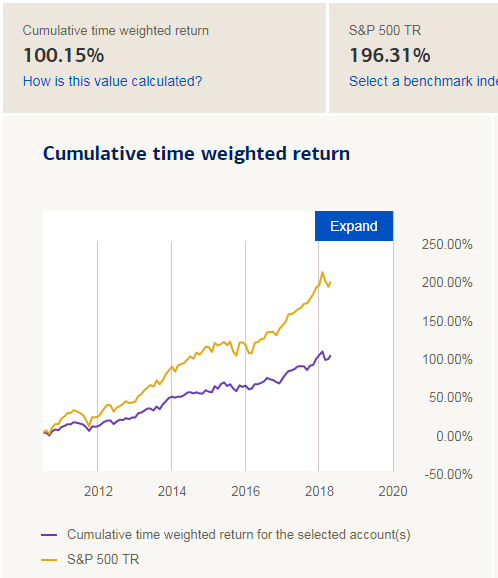
I’ll never forget the epiphany that punched me square in the face the day I opened up the Wall Street Journal to see this headline:
“The Only Six Stocks That Matter”
The article was published in July of 2015. And yes, I realize that in today’s fast moving market, I might as well be talking about 2015 via telegraph.
In any case, the article went on to explain the recent mind blowing index moving power of just a handful of stocks. Six, to be exact.
When the article was published, those 6 stocks – Amazon, Google, Apple, Facebook, Netflix, and Gilead Sciences, accounted for more than half of the Nasdaq’s $199 billion in gains during the year.
Similarly, the earnings of just six stocks (Amazon, Google, Apple, Facebook, Gilead, and Walt Disney) was more than the net gains of the entire S&P 500.
The article then went full doom-and-gloom by presenting the case that this was indicative of a weak stock market bound to collapse. (This prediction may have held some truth, but the correction was short-lived. From July 2015 to February 2016, the market dropped 12%, but today the market is up 38% since the article’s publishing.)
But when I read the report, the epiphany that punched me so hard in the face wasn’t that I needed to flee the market for the hills. If we exited the market every time a mainstream article expressed some concern, the time would never be right to invest.
No, what I saw was just how awesome index fund investing really is.
It’s Just So Hard to Be Average
The article was an extreme example, but it shed light on an often overlooked yet constant truth. Any index’s average return is primarily driven by a small handful of out of nowhere, bananas’ crazy, ultra-high performers.
Average market returns are exactly that – average. They’re not medians. There’s no friendly statistician to double check everything and kindly toss out the outliers.
Typically, those are the fastest growing/trendiest/quickest recovering/luckiest 10-15 companies out of all 500 companies included in the S&P 500 at any given time. As of June 2015, this number was precisely 6.
What’s this mean? To best capture the overall market gains, you should be holding the top 1-3% of stocks, at any given time. Talk about pressure.
Many stock pickers are understandably terrified of investing in the one stock that loses huge. These big losers can certainly wreck-havoc on a portfolio, but investors should be equally terrified of not holding the big winners.
And finding those big winners is even harder than avoiding the losers.
We’d like to think a certain level of business understanding and financial statement analysis can help avoid most losers. Even the slickest talking CEO can’t hide from an atrocious balance sheet.
Huge winners, on the other hand, tend to come out of nowhere. Their meteoric rise in share price is often driven by far more unpredictable intangibles, and prior to the breakout, they appear almost exactly like any other company.
(In the late 1990s, even the smartest analysts couldn’t dream what would happen to Apple. You’re telling me the company’s former CEO will reclaim his position and somehow create a ravenous cult following for the company? Then, the nearly bankrupt computer company will completely pivot to portable music players, which for whatever reason, emotional teenagers will decide are cool? Suuuure…)
Without riding the wave of these big winners, you could very well select a basket of mighty fine performing individual stocks while avoiding most of the losers. But the chances of you also holding adequate proportions of the 1-3% of companies truly driving the broader market’s gains is just another card stacking the deck against the individual stock picker.
When Being Right Isn’t Good Enough
My own investing experience might as well be a case study for this article.
When I first started investing, I was convinced I’d be the next Warren Buffett. I’d read and studied, and I just knew I’d picked out some amazing stocks ready to shock the world. Man, was I going to be rich…
I bought my well researched darlings, and… I was right! My carefully selected stocks soared in value, and I was feeling pretty smug. Altria increased 25%, Eli Lily made money hand over fist, and the gun company Sturm Ruger & Co had a legendary run up in response to fears about gun control.
All great performers, but none of the market’s best performers. And because I was holding some really good stocks, but not quite the best stocks, my performance lagged.

How To Ensure You Hold All The Winners
There’s an easy way to ensure you don’t miss out on any of the most influential market drivers. Buy everything.
Spray and pray, baby!

Throw out the fancy charts, hours of research, and agony of making the wrong move. Choosing to hold the entire index is the only way to ensure you’re riding the wave of prosperity whenever the stock market’s next Cinderella story takes off, no matter which company that happens to be.
Don’t look for the needle in the haystack. Just buy the haystack.” -John Bogle, Vanguard founder
Related Articles:


Back in 2010 at 18 (and 3 months haha), I opened up a brokerage account and bought individual stocks. All the way up til December 2016, I had been doing small contributions, as well as reinvesting dividends.
My strategy (for lack of a better word) was to buy what I knew. This included Apple, AT&T, GE, Dr. Pepper Snapple (now Keurig Dr. Pepper), Ford, and Tesla. I’ve since added a REIT stock, Scott’s Miracle Grow, and one pharmaceutical company that has been doing stuff with marijuana.
I know the volatility it carries would give some people a heart attack, but I’ve been very fortunate and even lucky at times since I got in to Tesla at ~$24, and my 7-1 split adjusted price for Apple is around ~$28. I’ve tripled my cash investment over the 8 years, and now just let it ride with reinvesting the dividends but no new contributions. I’d also add that I’ve bought and been holding things ever since, no panick selling.
Everything I do now is focused on my Roth IRA which is in ETF’s, and 401(k) with a Vanguard Target Date.
My plan is to use some of the brokerage account for a down payment on a house, or slowly sell off my positions to reinvest in less volatile positions, so I’ll be looking into this further to make sure I don’t trigger any big tax implications.
Hey Money Wizard!
Great post, and a really interesting read. It’s crazy how only 6 out of 500 stocks went on to do fantastically well. Man, what are the chances of picking those stocks? Plus, stock prices aren’t only driven by financials – they’re driven by market sentiment, lots of speculation and those “emotional teenagers” you mentioned. Everything that humans are unable to predict.
I’m 25 this year, and I’ve invested my almost-six-digit savings only in indexes. The returns of which will be contributed by the big winners, like you said! On top of that, I love the peace of mind knowing that since I’ll be in the stock market for the next 4 decades, my entire retirement fund will be there waiting for me. Without requiring those fancy charts or hours and hours of research 🙂
I have a saying I often remind myself of “Let your winners run.” — meaning the winners are winning for a reason. Not selling them is (usually) the right move.
Good luck to you!
Index funds make investing easy. A mix of three or four funds will allow the average individual investor to out perform 80% of the other investors. Find an asset allocation that matches your age and risk tolerance and forget about it. It really can be that easy.
Mr. Wizard – first allow me to commend your amazing success and mindset. Most people your age are too busy getting a new lease every 2 years or blowing cash on annual phone upgrades. You’re truly a man after my own heart.
If you would, I’d like to get your thoughts on the Vanguard Growth Index Fund ETF Shares (VUG). I’m looking for more capital appreciation over the next decade, and am not concerned about dividend income. Would going all in on the VUG in lieu of the VTI be prudent, stick soley with the VTI or perhaps a combination of both?
At 39, my situation is as follows…
* $370k in home equity – owned outright, but continue to make the mortgage payment to myself
* $260k in equities in tax advantaged retirement accounts – still fully max out 401k contributions
* $180k in cash – Too much for your liking I know, but I do have a family so it gives me the warm and fuzzies
All new investment would be in an after tax brokerage account. Appreciate the insight. Thanks…